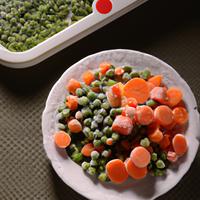
1 serving (100 grams) contains 52 calories, 3.1 grams of protein, 0.3 grams of fat, and 9.5 grams of carbohydrates.

Log this food in SnapCalorie

Nutrition Information
Calories |
104 | ||
|---|---|---|---|
% Daily Value* |
|||
| Total Fat | 0.6 g | 0% | |
| Saturated Fat | 0.1 g | 0% | |
| Polyunsaturated Fat | 0 g | ||
| Cholesterol | 0 mg | 0% | |
| Sodium | 120 mg | 5% | |
| Total Carbohydrates | 19 g | 6% | |
| Dietary Fiber | 7.2 g | 25% | |
| Sugars | 9 g | ||
| protein | 6.2 g | 12% | |
| Vitamin D | 0 mcg | 0% | |
| Calcium | 50 mg | 3% | |
| Iron | 2.6 mg | 14% | |
| Potassium | 400 mg | 8% | |
* Percent Daily Values are based on a 2,000 calorie diet. Your daily values may be higher or lower depending on your calorie needs.
Food Attributes
Source of Calories
About Frozen pea and carrot
Frozen peas and carrots are a convenient and versatile vegetable mix commonly found in cuisines worldwide. This classic pairing includes sweet, nutrient-rich green peas and tender, subtly sweet orange carrots, typically flash-frozen to preserve flavor and nutrients. Originating from the practice of root and legume preservation, this combination is a staple in side dishes, soups, stews, and casseroles. Packed with dietary fiber, vitamins A, C, and K, frozen peas and carrots support digestive health, immunity, and vision. They are low in fat and calories, making them a healthy option for weight management. However, some pre-packaged varieties containing added sauces, salts, or butter may increase sodium or calorie content, so it’s wise to check labels. Their convenient preparation and ability to complement a wide array of dishes make frozen peas and carrots a nutritious and accessible choice for balanced meals.



